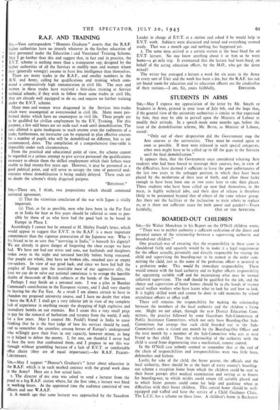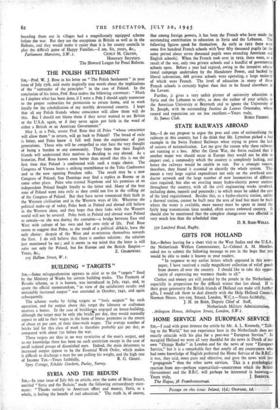BOARDED-OUT CHILDREN
SIR,—Sir Walter Monckton in his Report on the O'Neill children wrote, " There was in neither authority a sufficient realisation of the direct and personal nature of the relationship between a supervising authority and boarded-out children."
One practical- way of ensuring that the responsibility in these cases is shouldered fairly and squarely would he to make it a legal requirement for the officer actually, personally and directly responsible for visiting the child and supervising the boarding-out to be named in the order com- mitting the child, just as the name of the probation officer is inserted in a probation order. This would fix immediate responsibility. There would remain with the local authority and its higher officers responsibility for appointing suitable staff and for maintaining what may be termed collateral supervision. The staff should be qualified for the job, and the choice and supervision of foster homes should be in .the hands of trained social welfare workers who have learnt what to look for and how to look. It is highly skilled work and cannot be done in odd moments by school attendance officers or office staff.
There still remains the responsibility for making the relationship between the members of the local authority and the children a living one. Might we not adopt, through the new District Education Com- mittees, the practice followed by some Guardians Sub-Committees of Public Assistance Committees, which not only have Boarding-Out Sub- Committees but arrange that each child boarded out in the Sub- Committee's area is visited one month by the Boarding-Out Officer and the next month by a member of the Sub-Committee who acts as next friend to that child. Thus the relationship of the authority with the child is saved from degenerating into a mechanical, remote control.
In the O'Neill case nobody seemed to remember that at the end of the chain of responsibilities and irresponsibilities were two little boys, defenceless and forlorn.
Lastly, for sake of the child, the foster parent, the officials and the local authority, there should be at the heart of every county's boarding- out scheme a reception home from which the children could be sent to their foster parents after medical examination and vetting as to fitness for boarding-out, to which misfits could return till suitably placed and to which foster parents could come for help and guidance when in difficulties with their foster children. This central home should be, well- equipped and Staffed and have the service of a Child Guidance Clinic. The L.C.C. has a scheme on these lines. A children's home in Bucharest
boar-ding them out in villages had a magnificently equipped scheme before the war. But they are the exceptions in Britain as well as in the Balkans, and they would make it easier than it is for county councils to play the difficult game of Happy Families.—I am, Sir, yours, &c., Honorary Secretary.
The Howard League for Penal Reform.



























 Previous page
Previous page